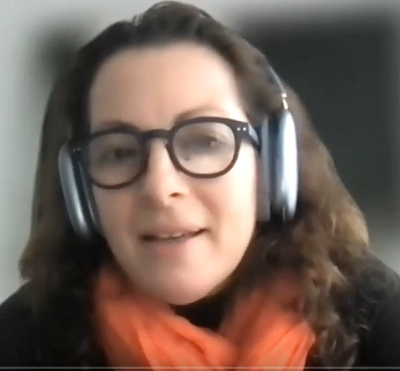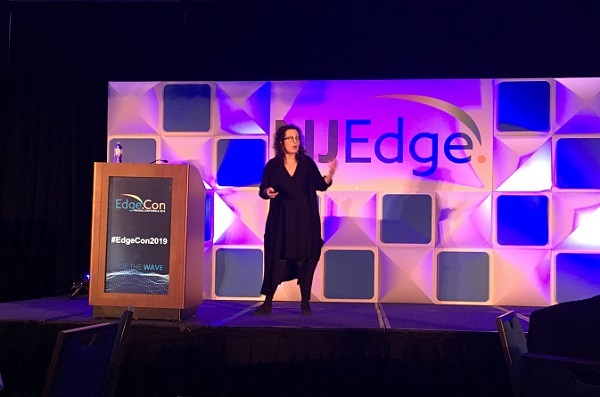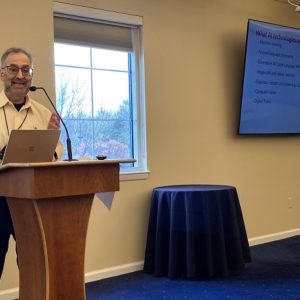At SheTek, NJ’s Chief Innovation Officer Beth Noveck Talks About Solving ‘Wicked’ Problems
SheTek (Princeton), a not-for-profit organization that helps women get started and get ahead in technology careers, held its annual conference in October.
According to Chaya Pamula, founder and president of SheTek and also cofounder and CEO of PamTen, a Princeton-based IT solutions company, SheTek is not trying to reinvent the wheel. “It’s about creating a strong ecosystem through our partnerships with universities, corporates, various entrepreneurs and many other associations and groups.” The organization offers programs in three categories: training, job readiness, and mentorship and sponsorship.
Giving a keynote address was Beth Simone Noveck, New Jersey’s chief innovation officer. Noveck said that she was particularly pleased to be at the event. “I think this kind of peer-to-peer mentoring, especially around technology and for women in technology, is so important.
“And as a woman in technology and as somebody who comes from a line of women whose lives have been transformed by technology, I just really can’t applaud enough what you’re doing here to create that fellowship and mentoring and opportunity and to encourage more people to go into technology.”
Noveck’s inspiring talk was about solving hard problems, sometimes called “wicked problems,” that plague society. “They’re the kinds of problems that I have the great fortune to work on with my team in the Office of Innovation every day, which is really solving hard challenges in the world.”
Noveck’s background includes working at the White House during the Obama administration to start the Open Government Initiative. Despite the well-publicized failures of some of the systems in the New Jersey government, Noveck said that Governor Phil Murphy has put “innovation and technology front and center.” New Jersey is one of very few states that “has created an Office of Innovation that is focused on building front-end tech for social good.”
She noted that big societal issues like climate change, racial inequality and economic inequality may not be changeable through a wholesale approach. Instead, it may require incremental steps.
Paraphrasing the Jewish text “Ethics of the Fathers,” Noveck noted that “it’s not your responsibility to finish the work of protecting the world, but you’re not free to desist from it, either. In other words, each of us must do what we can to make a difference, to make that dent in the universe. … But in order to make that difference, we have to have a process, a set of pathways, a set of heuristics” for making a difference in the world.
After discussing how the state’s COVID-19 Information Hub website was designed, using the questions received both online and over the phone to figure out what information was needed on the site, Noveck added that this kind of data collection is not enough. You must be careful to get to the root of the problem, and then you might come up with a creative solution, she said.
“Problem definition is perhaps the most important skill we can develop for ourselves, especially in technology, to ensure that we take the time to learn from people and from data what’s the problem that we’re solving. But then we can, of course, go out and use technology to help people to come up with solutions to problems.”
She added, “We have to learn the skill not only of how to define problems, but how to implement solutions to problems. And that’s where learning how to partner with other people, how to build coalitions, how to do things with people, is extraordinarily important.” After a government agency implements that app, it must figure out how that app is working, to see if it is actually doing what was intended and if people find it easy to use.
Noveck ended her talk with a call to action for the SheTek audience — specifically, to build this skillset for themselves. She talked about a free online course she developed that’s now offered on The GovLab, in which anyone can learn “how to use data, how to use the wisdom of communities and how to use technology to enable you to do both those things, to solve problems in new ways. …These are enabled by technology, but they’re not technology in and of themselves. They’re new ways of working, enabled by technology.
“Why do we need to do this? We need to do this because we have a lot of problems in the world. Whether it’s the acute challenge of COVID or whether it’s a chronic and long-term challenge of racial inequality, or climate change or economic inequality, we each need to do our part to make change happen in the world.”
The talk included a Q&A at the end. Asked about her greatest achievements in New Jersey as head of the Office of Innovation, she told an audience member that the biggest success was “what we leave behind in terms of showcasing that working differently, that using problem solving, using human-centered and data-driven approaches, is really a better way of doing things because it allows us to do things faster.”
The office was able to “stand up” the COVID-19 website in three days, she said. They knew the first version wouldn’t be perfect, but they also knew that they could improve on it in later iterations. “That really helps, I hope, to be a pathway to pave the way for more people being more agile, more experimental and changing the culture of government.”




